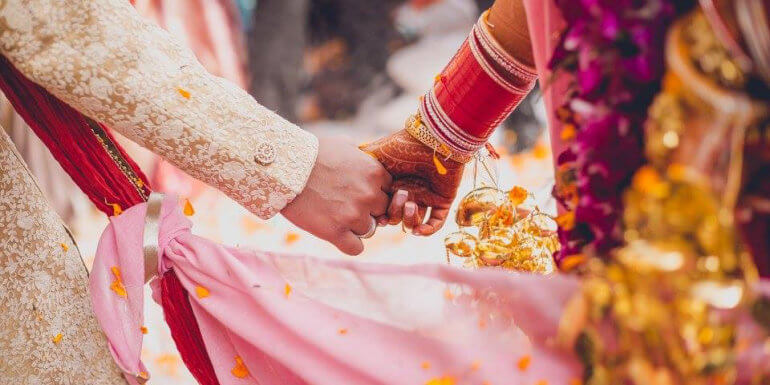
Marriage is a special event in everyone’s life. It is not only a union of two individuals’ but their souls as well and is the most precious bond between two different individuals. In the Indian society, marriage is considered as a holy event. It doesn’t matter whether it’s a Bengali wedding conducted in the wedding lawns in Kolkata or a Punjabi wedding being solemnized in the farmhouses of Delhi. There are many religions, cultures, and traditions in India and all of them have special status when it comes to marriages. It’s nice to understand the beauty of the different types of marriages in India and their rituals which make each type of wedding a unique affair.
Let’s know more we know a little about.
Sikh Wedding
Here, the marriage is conducted through the Anand Karaj ceremony and it mostly happens during the afternoons. The bride and groom worship the Guru Granth Sahib and bow their heads in front of it as the ceremony is completed.
Assamese Wedding
Unlike other kinds of weddings, Assamese wedding is a little different in nature. Here, the feast actually takes place before the actual ceremony. It mostly consists of lavish dishes and mouth-watering desserts while in earlier days only rice, jaggery and curd were served in the feast. On the day of the wedding, the bride along with the groom’s mother goes to the nearby river to take a bath in the holy water; this is a sacred ritual according to them.
Marwari Wedding
Marwari weddings are similar to other north Indian weddings in some ways. There is a fun ritual where the groom uses a neem stick to break a toran which is tied at the doorway the moment he arrives at the bride’s house. Pithi Dastoor is a ritual here which starts before the wedding and continues till the end.
Parsi Wedding
In a Parsi wedding, the gathering on the marriage day is called Shahjan. The groom is the first to take place in the wedding hall followed by the bride. The bride comes later. The ceremony mostly takes place at a Baug or at an Agiary and is called “Achumichu” in their language.
Jain Wedding
Jain marriage is comparatively less extravagant and is more a ritualistic affair. We all know how the Jain’s don’t like to waste time and money over pomp and show of any kind. The most important rituals of a Jain wedding are Phere, Kanyavaran, havan and Granthi Bandhan. The wedding is said to be solemnized only once the rituals are over.
Christian Wedding
Christian weddings are so peaceful and divine. The ceremony is conducted in a church. The best man greets the bride with a bouquet of flowers as she enters the church. The father accompanies the bride to the altar where the groom declares his wedding vows in the presence of two witnesses. The priest blesses the newly wedded couple after the couple exchanges their rings. They are then declared husband and wife.
Kannada Wedding
Here the bride’s face is covered with a fan made out of peacock feathers as is brought to be seated at the mandap by her sisters. By performing a ritual called ‘Dhare Herdu’ the parents give away their daughter. Then ‘Satapadi’ is performed which is completed by taking seven circles of the holy fire.
Maharashtrian Wedding
Maharashtrian weddings are a simple affair than any other types of marriages in India. During the wedding, the couple is separated by a silk shawl. Thereafter, the ‘Mangalashtak’ is recited and the shawl is removed. The ‘Shakhar Puda’ or engagement ceremony takes place earlier. The couple seeks permission from their parents to get tied in the knot after performing few rituals. The Pheras are finally performed after the couple receives the consent.
Kashmiri Wedding
A Kashmiri wedding is soulful and one of the most peaceful as we can say! It is also similar to the Hindu weddings in a lot of ways but has comparatively less pomp and show. Here is a ceremony called “Digun” which is performed and is similar to the “Haldihath Rasam”. Both the fathers of the couple exchange nutmeg as a symbol of their friendship once the groom and his family arrive.
Muslims Wedding
Muslim weddings have a lot of pre-wedding, wedding and post-wedding rituals. In the pre-wedding rituals’, mehndi is an important ceremony. There are rituals like welcoming the baraat here like the Hindu weddings. The main ritual is the Nikah and it is held either at the home of the bride or any other common venue.
Buddhist wedding
The Buddhist wedding is a very simple and sober affair. The Buddhist marriage is more of a family affair with no religious obligations like horoscopes and astrology, and no other social obligations like feast and grandeur. People generally visit the temple and take blessings from the monks to solemnize the marriage even though there is no hard-lined ritual for a Buddhist wedding.
Bengali Wedding
It is the ‘Saat Paak’ in which the bride encircles the groom seven times while covering her face with the betel leaves which is the highlight of Bengali weddings. After the saat paak, the bride removes the leaves from her face and the couple’s eyes finally meet in another ritual called Shubhodrishti. This ritual is followed by the blowing of the conch shells which is what a Bengali wedding is most famous for.
Punjabi Wedding
Here different rituals are held pre-marriage, on the main day and post-wedding as well. Customs like Ganesh puja, haldi, Sagan, sangeet, and sagaai are held before the wedding day. The most important rituals are Jaimala, sindoor, kanyadaan, Saptapadi etc. without which a Punjabi wedding is never complete. Mostly conducted at night, Punjabi marriages are very royal and extravagant in every sense.
It really doesn’t matter which is the faith, the religion, the sector the ritual because every wedding is sacred and every institution has equal importance before God. Bonds are made in heaven and marriages are solemnized on earth, it is up to us to conduct them with the full faith and keep them going with utmost devotion throughout the circle of life!
